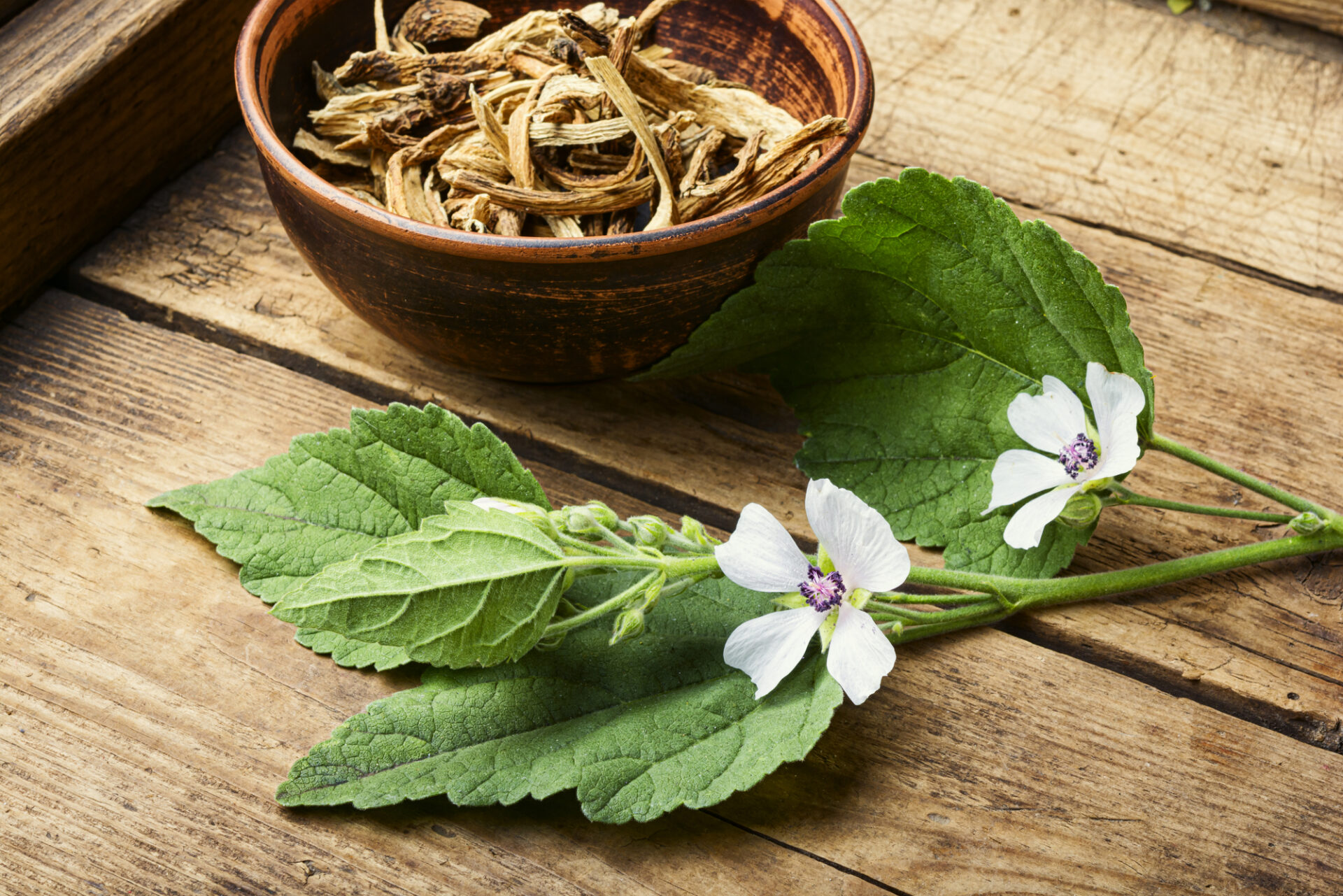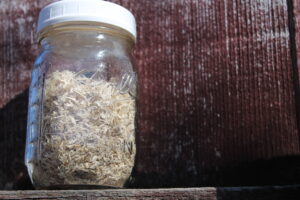Marshmallow root
Overview
The Althaea officinalis, commonly known as marshmallow root, is a perennial herb with notable mucilaginous properties and a sweet, herbaceous flavor. It has been traditionally used in folk medicine for soothing sore throats, coughs, and digestive issues. While it is generally considered safe for consumption in various forms, its effects when smoked are less clear, and users should exercise caution.
Common name(s): Marshmallow plant, marsh mallow, white mallow, sweet weed, mallards, guimauve
Scientific name: Althaea officinalis

Characteristics
Known for its mucilaginous roots, herbal medicine applications, and sweet, herbaceous flavor.
Region
The plant is typically found in Europe, North Africa, and Western Asia.
Natural Habitat
Typically found along river banks, in salt marshes, and preferring moist, sandy soils.
Cultivation
Prefers full sun to partial shade, consistent moisture, and well-draining, loamy but fertile soil.
Traditional Usage
Marshmallow root has a rich history in herbal medicine, reaching back to ancient Greek and Egyptian civilizations. It’s known for its soothing properties, particularly for respiratory and digestive systems. When smoking herbs, individuals seek to enjoy similar traditional benefits, although empirical evidence on the practice is limited. Below are the traditional uses of marshmallow root that have been documented over centuries:
- Relieving coughs and sore throats due to its demulcent properties that soothe mucous membranes.
- Alleviating congestion in the upper respiratory tract.
- Supporting digestive health and protecting against ulcers by forming a protective layer in the digestive system.
- Contributing to overall immune health.
Though traditionally consumed in various forms, the practice of smoking marshmallow root is not well-documented, and the potential risks or benefits remain largely unexplored. Consumers should exercise caution and consult healthcare professionals before considering new herbal practices.
Historical Usage
Used over 2,800 years ago in Greek and Egyptian medicine for coughs and sore throats; historically made into a confection.
Common Usage
Currently used in herbal medicine to treat coughs, sore throats, digestive issues, and support immune health.
Effects
Marshmallow root is renowned for its therapeutic properties, particularly its ability to soothe and protect irritated tissues. For those interested in its benefits, it’s important to understand what this herb can do for your body when used in forms other than smoking, such as teas or tinctures.
Here’s a closer look at the general effects of marshmallow root:
- Relieves Coughs: Thanks to its mucilage content, marshmallow root forms a soothing film over the mucous membranes, which can help reduce coughing.
- Alleviates Digestive Issues: This root can coat the digestive tract, thus easing the discomfort from various digestive issues.
- Supports Immune Health: Some constituents in marshmallow root may help bolster the body’s immune response.
- Soothes the Throat: A natural demulcent, marshmallow root is often used to soothe a sore or irritated throat.
- Protects Against Ulcers: Its soothing effect may also contribute to the prevention of ulcers by forming a protective barrier on the lining of the stomach.
Marshmallow root’s active compounds, such as flavonoids and phenolic acids, are believed to enhance these effects4. While it is known to be generally safe, it’s crucial to be aware that marshmallow root can interact with certain medications, slowing their absorption due to its mucilaginous properties4.
It’s important to consult with a healthcare provider before incorporating marshmallow root into your routine, ensuring you can enjoy its benefits without compromising your overall health.

Soothing and protective, marshmallow root supports digestive and respiratory health with its mucilaginous properties.
Effects when smoking
Marshmallow root has been celebrated through history for its soothing properties, particularly for the throat and digestive system. While traditionally used in teas and tinctures, its effects when smoked are less documented. Here’s what you should know:
- Marshmallow root contains mucilage, a substance that can coat and soothe the mucous membranes of the throat.
- Its demulcent nature may provide relief for an irritated throat, potentially beneficial for those seeking a natural remedy for throat discomfort.
- Smoking the root could offer a sweet and herbaceous flavor, linking back to its historical use in confections.
- However, the act of smoking marshmallow root is not widely studied, and inhalation of any plant material could pose potential risks, including respiratory irritation.
- Users who choose to smoke marshmallow root for its purported benefits should do so with caution. It’s important to be aware that it could interfere with medication absorption due to its mucilage content.
Marshmallow root is legal and commonly sold in various forms for its medicinal benefits. User reports vary, and while some find it soothing, individual experiences should not substitute professional medical advice. Always consult a healthcare provider before starting new herbal practices14.
Flavor Profile
Sweet, herbaceous flavor profile.
Edible Parts
Roots, leaves, and flowers
Effects when Smoked
Limited evidence exists on effects; potential respiratory irritation and other health risks may occur when smoked.
User Experiences
Users often report relief from sore throats and digestive discomfort after using marshmallow root.
Medicinal Benefits
Marshmallow root may hold a variety of medicinal benefits. Its high mucilage content contributes to a demulcent effect, creating a soothing barrier on mucous membranes. Below are some of the potential health advantages linked to this herb:
- Alleviates coughs: It can calm a dry or irritated throat, making it useful for cough relief.
- Ulcer protection: The soothing properties may protect against the development of ulcers.
- Immune support: Compounds in the root might bolster the body’s immune defenses.
- Digestive health: Its soothing qualities can help address various digestive issues.4
As always, when considering the use of herbs for medicinal purposes, it is important to consult with a healthcare professional, especially due to the potential interaction of marshmallow root with certain medications.
History and Folklore
Historically, marshmallow root has been a notable component in ancient Greek and Egyptian healing practices, with written references that date back over 2,800 years. The herb was mentioned in texts such as Homer’s “Iliad,” underscoring its role in treating coughs, sore throats, and congestion. Beyond its medicinal uses, the marshmallow root also enjoyed a place in the making of sweets, where its naturally sweet and herbaceous flavor led to the creation of early versions of the marshmallow confection—quite different from what we know today 1 5.
With its versatility and history, marshmallow root continues to be appreciated for its therapeutic potential.

Marshmallow root has a rich legacy in ancient wellness practices, revered in Greece and Egypt for its effectiveness against respiratory ailments, and it lays the foundation for the sweet marshmallow treats we relish today.
Side Effects and Contraindications
- Marshmallow root may interact with certain medications, potentially hindering their absorption due to its mucilage content.
- More common side effects could include upset stomach or dizziness for some individuals.
- While smoking any herb, including marshmallow root, there’s a potential risk for respiratory irritation.
- Individuals with diabetes or on medication that affects blood sugar levels should be cautious as marshmallow root might affect blood sugar control.
- It is advised to avoid use during pregnancy and breastfeeding, due to insufficient data on its safety for these populations.
- People with allergies to plants in the Malvaceae family should also avoid marshmallow root to prevent allergic reactions.
Legal Status
Marshmallow root is legal to buy and use in many forms, including teas, capsules, and tinctures. It’s widely available for those interested in exploring its uses in herbal medicine[1] [2] [4]. As with any herb or supplement, it’s important to abide by local regulations, but no widespread legal restrictions apply to marshmallow root. This makes it readily accessible for those who wish to incorporate it into their lifestyle for its potential health benefits.
References
1. Dr. Axe. “Marshmallow Root Benefits, Uses, Risks, Side Effects and More – Dr. Axe.” Draxe.com. https://draxe.com/nutrition/marshmallow-root/
2. HerbRally. “Marshmallow Monograph — HerbRally.” Herbrally.com. https://www.herbrally.com/monographs/marshmallow
3. Wikipedia. “Althaea (plant) – Wikipedia.” En.wikipedia.org. https://en.wikipedia.org/wiki/Althaea_(plant)
4. Medical News Today. “Marshmallow root: Benefits, risks, and uses – Medical News Today.” Medicalnewstoday.com. https://www.medicalnewstoday.com/articles/324860
5. Wikipedia. “Althaea officinalis – Wikipedia.” En.wikipedia.org. https://en.wikipedia.org/wiki/Althaea_officinalis
Image Credit: bill barber
Image Credit: shalommama
Image Credit: Swamibu
Nicolas Duval
Nicolas is a passionate advocate for nature and the art of wildcrafting. His dedication shines through in Wildcraftia, a website he meticulously crafted to serve as a haven for nature enthusiasts worldwide. Driven by a deep appreciation for nature’s connection to humanity, Nicolas embarked on his journey in 2011 with SmokableHerbs, a platform showcasing his love for nature’s bounty. Building upon this foundation, he established Smokably, a thriving online store offering premium herbs and blends to a global audience.
